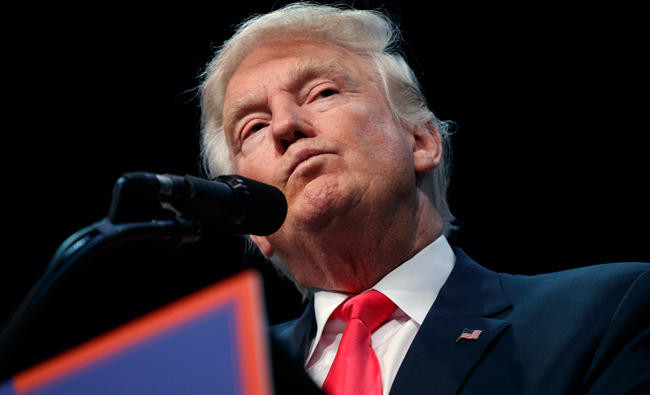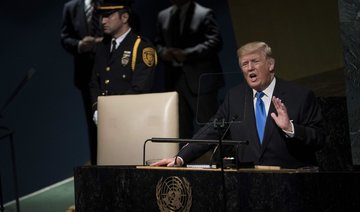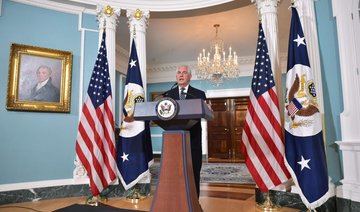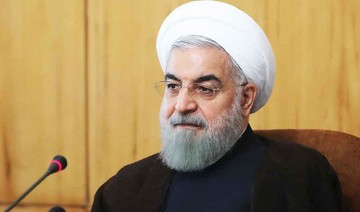Washington: President Donald Trump has railed against a deal to curb Iran’s nuclear program, but officials say that far from scrapping it, he is considering kicking the decision to Congress.
Ahead of an Oct. 15 deadline, several officials familiar with White House deliberations told AFP Trump has made it clear he does not want to certify Iran’s compliance with the accord.
The 2015-era Obama agreement offered Tehran relief from punitive economic sanctions, in return for limits to uranium enrichment and intrusive inspections.
Every 90 days Trump must decide whether Iran is living up to its end of the bargain, something that has already caused him political pain on two occasions.
The Trump administration has publicly accused Iran of violating the “spirit” of the accord — known as the JCPOA — although some officials privately admit there is a thin line between testing the limits and a material breach.
Trump’s top military adviser, the chairman of the joint chiefs of staff, Gen. James Dunford, has told Congress the briefings he has received “indicate that Iran is adhering to its JCPOA obligations.”
But Republicans are under domestic political pressure to fulfill campaign and donor promises to scrap the accord.
Trump has called the deal an “embarrassment to the United States” and had urged allies and fellow signatories in London, Paris and Berlin to renegotiate it, something they are unwilling to do.
But now a middle path is being explored, which would make Trump’s opposition clear, but stop short of scrapping the deal outright and perhaps clear the 90-day-review off his desk.
Under the plan, Trump could find Iran in breach or — less provocatively — refuse to certify Tehran’s compliance, giving Congress 60 days to decide whether to impose sanctions.
The issue has prompted fierce debate inside the administration, and with this mercurial president, anything is still possible between now and the deadline.
But “it seems like he was leaning that way,” said one official, echoing the accounts of others who refused to speak on the record, because of the sensitivity of the subject.
Trump weighs ‘decertifying’ Iran nuclear deal
Trump weighs ‘decertifying’ Iran nuclear deal

France urges European Commission to be firm against Musk interference

“Either the European Commission applies with the greatest firmness the laws that we have given ourselves to protect our public space, or it does not do so and then it will have to agree to give back the capacity to do so to the EU member states,” Foreign Minister Jean-Noel Barrot told France Inter radio.
South Korea’s Yoon faces new arrest attempt in fortified compound

Acting president Choi Sang-mok urged on Wednesday authorities to “do their best to prevent any injuries to citizens or physical conflict between government agencies” while executing Yoon’s arrest warrant.
Protesters supporting and opposing the embattled Yoon braved freezing temperatures to stage rallies on the streets around the presidential compound on Wednesday after a court re-issued a warrant on Tuesday to arrest him.
The Presidential Security Service (PSS) has been fortifying the compound this week with barbed wire and barricades using buses to block access to the residence, a hillside villa in an upscale district known as Korea’s Beverly Hills.
Yoon is under criminal investigation for insurrection over his failed attempt to impose martial law on Dec. 3, a decision that stunned South Korea and prompted the first arrest warrant for a sitting president.
He also faces an impeachment trial in the Constitutional Court.
One of Yoon’s lawyers said the president could not accept the execution of the arrest warrant because it was issued by a court in the wrong jurisdiction and the team of investigators formed to probe the incumbent leader had no mandate to do so.
Yoon Kab-keun, the lawyer, also denied suggestions by some members of parliament that Yoon had fled the official residence, saying he had met the president there on Tuesday. He said they were “malicious rumors” intended to slander Yoon.
On Tuesday, Oh Dong-woon, head of the Corruption Investigation Office for High-ranking Officials (CIO), which is leading the investigation, apologized for failing to arrest the president last week after a six-hour standoff with hundreds of PSS agents, some of whom were carrying firearms, and military guards at the compound.
“We’ll do our best to accomplish our goal by thoroughly preparing this time with great determination that the second warrant execution will be the last,” Oh told a parliament committee.
He declined to specify how many days the court had given before the new arrest warrant expired.
Oh did not object when members of parliament called for tough action to overpower the presidential guards and military troops inside the compound, but he declined to discuss what options were being considered to achieve that.
Various scenarios reported in local media included mobilizing police special tactical units and heavy equipment to push through the barricades, followed by more than 2,000 police to drag out presidential guards, taking as long as three days if necessary to wear down presidential security agents.
Shin Yul, a Myongji University professor who has followed the political turmoil, said police had lots of experience with the tactical operations that were likely being considered. But safety should be a top priority, especially for protesters, he said, noting the risk of gunfire in a potential clash.
Although police have a clear advantage in terms of resources such as helicopters to drop in tactical units, force should not be the only option considered, said Lee Yung-hyeock, a Konkuk University professor specializing in law enforcement.
He cited “cognitive warfare” such as using loudspeakers to persuade PSS agents they could face personal repercussions by obstructing justice that could mean the end of their careers and possible criminal records.
EU won’t tolerate attacks on its borders, French foreign minister says after Trump’s Greenland comments

PARIS: The European Union will not let other nations attack its sovereign borders, French Foreign Minister Jean-Noel Barrot said in response to US President-elect Donald Trump’s comments on Greenland regarding the “ownership and control” of the vast Arctic island that has been part of Denmark for over 600 years.
“There is obviously no question that the European Union would let other nations of the world attack its soverign borders, whoever they are ... We are a strong continent,” Barrot said.
President-elect Donald Trump on Tuesday said he would not rule out the use of military force to seize control of the Panama Canal and Greenland, as he declared US control of both to be vital to American national security.
Speaking to reporters less than two weeks before he takes office on Jan. 20 and as a delegation of aides and advisers that includes Donald Trump Jr. is in Greenland, Trump left open the use of the American military to secure both territories. Trump’s intention marks a rejection of decades of US policy that has prioritized self-determination over territorial expansion.
Greenland, home to a large US military base, is an autonomous territory of Denmark, a longtime US ally and a founding member of NATO. Trump cast doubts on the legitimacy of Denmark’s claim to Greenland.
The Panama Canal has been solely controlled by the eponymous country for more than 25 years. The US returned the Panama Canal Zone to the country in 1979 and ended its joint partnership in controlling the strategic waterway in 1999.
Bangladesh orders banks to assist UK minister graft probe

- Last month the national anti-corruption commission launched a probe into the alleged embezzlement by Hasina’s family of $5 billion connected to a Russian-funded nuclear power plant
Dhaka: Bangladesh money laundering investigators have ordered the country’s big banks to hand over details of transactions relating to British anti-corruption minister Tulip Siddiq in an ongoing graft probe, officers told AFP.
Siddiq is the niece of former Bangladeshi premier Sheikh Hasina, who fled abroad last August after a student-led uprising against her iron-fisted tenure.
Last month the national anti-corruption commission launched a probe into the alleged embezzlement by Hasina’s family of $5 billion connected to a Russian-funded nuclear power plant.
Two officials from the Bangladesh Financial Intelligence Unit (BFIU), speaking to AFP on condition of anonymity, confirmed that Bangladeshi banks had been instructed to furnish any financial records relating to Siddiq.
A BFIU document issued Tuesday and seen by AFP showed that banks had also been told to provide transaction records for Hasina, her son and daughter, Siddiq’s two siblings and her mother Sheikh Rehana.
The kickback allegations relate to the $12.65 billion Rooppur nuclear plant, which was bankrolled by Moscow with a 90 percent loan.
“The claims of kickbacks, mismanagement, money laundering, and potential abuse of power raise significant concerns about the integrity of the project and the use of public funds,” the anti-corruption commission said last month when announcing the probe.
The order came a day after British Prime Minister Keir Starmer revealed that Siddiq had referred herself to his standards adviser.
Siddiq insists she has done nothing wrong and a spokesman for Starmer said he retains “full confidence” in her.
The referral came after the Sunday Times and Financial Times newspapers reported that she had lived in properties linked to her aunt Sheikh Hasina’s administration.
“In recent weeks I have been the subject of media reporting, much of it inaccurate, about my financial affairs and my family’s links to the former government of Bangladesh,” Siddiq wrote in her letter to ministerial standards watchdog Laurie Magnus.
“I am clear that I have done nothing wrong,” she added. “However, for the avoidance of doubt, I would like you to independently establish the facts about these matters.”
Her aunt Hasina, 77, fled Bangladesh by helicopter on August 5, shortly before protesters stormed her palace in the capital Dhaka.
She remains in neighboring India but the interim government that replaced her has demanded her extradition to face trial for the police killing of protesters during the revolt against her regime.
US seeks prisoner swap with Afghanistan involving Guantanamo detainee arrested in Pakistan — media

- Outgoing US administration seeks to bring back three Americans in exchange for Muhammad Rahim Al-Afghani
- Al-Aghani reportedly had ties with bin Laden and was the last person brought to the CIA interrogation program
WASHINGTON: The Biden administration is negotiating with Afghanistan to exchange Americans detained in the country for at least one high-profile prisoner held in Guantanamo Bay with alleged ties to former Al Qaeda leader Osama bin Laden, the Wall Street Journal reported on Tuesday.
Representatives of the White House and the US State Department did not immediately respond to requests for comment on the report. Representatives for the Afghan Taliban also did not immediately respond.
US President Joe Biden’s administration is seeking the return of three Americans seized in 2022 — Ryan Corbett, George Glezmann and Mahmood Habibi — in exchange for Muhammad Rahim Al-Afghani, the WSJ reported.
A source familiar with the matter confirmed to Reuters that the Biden administration has been negotiating with the Taliban since at least July on a US proposal to exchange Corbett, Glezmann and Habibi for Rahim.
The Taliban, who deny holding Habibi, countered with an offer to exchange Glezmann and Corbett for Rahim and two others, said the source, who spoke on condition of anonymity because of the sensitivity of the issue.
Corbett and Habibi were detained in separate incidents in August 2022 a year after the Taliban seized Kabul amid the chaotic US troop withdrawal. Glezmann was detained later in 2022 while visiting as a tourist.
A spokesperson for the National Security Council said they could not confirm the WSJ story, but added that the administration was “working around the clock” to secure the release of the three Americans.
Rahim’s lawyer, James Connell, told Reuters that neither the Biden administration nor the Taliban had informed him or Rahim of the negotiations.
“It does seem important to include Rahim or his representative in the conversation,” said Connell. “As it happens, he is willing to be traded or exchanged.”
Rahim was “the last person brought into the CIA torture program,” said Connell, referring to an agency program instituted after the Sept. 11, 2001, Al Qaeda attacks that used harsh interrogation methods on suspected Islamist militants.
The CIA denies the methods amounted to torture.
A Senate intelligence committee report on the agency’s so-called enhanced interrogation program called Rahim an “Al Qaeda facilitator” and said that he was arrested in Pakistan in June 2007 and “rendered” to the CIA the following month.
He was kept in a secret CIA “black site,” where he was subjected to tough interrogation methods, including extensive sleep deprivation, and then sent to Guantanamo Bay in March 2008, the report said.
The US-Taliban talks have been in motion since July, according to the WSJ, which cited sources who attended a classified House Foreign Affairs Committee briefing last month with White House national security adviser Jake Sullivan.
On Monday, Biden’s administration sent 11 Guantanamo detainees to Oman, reducing the prisoner population at the detention center in Cuba by nearly half as part of its effort to close the facility as the president prepares to leave office Jan. 20.
















